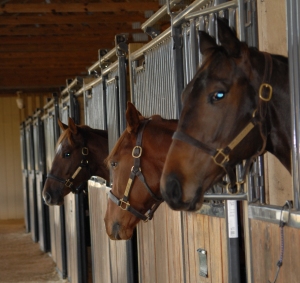The evidence connecting stables to stress is solid. Popular consensus, backed by this research and good ol’ common sense, is starting to lean towards a less-managed lifestyle, too. But there are still plenty of naysayers and traditionalists, especially in the helicopter-parenting world of high-end equines. They say stalls are actually good for horses.
I stumbled across one such blogger:
Liv Guide, the author of Pro Equine Grooms writes, in part:
- Stalls are a wonderful way to keep horses… It’s easier to regulate input and output when horses are kept in stalls. And by that I mean what they eat and what they poop.
- It’s easier to keep them clean
Unfortunately, her points are entirely focused on the needs of humans than horses. They come in the wake of research showing that stress in stalled horses can be three to four times higher than horses allowed to remain unstalled and in groups.
The research, conducted by eight vets and scientists and led by Dr. Regina Erber of the University of Veterinary Medicine in Vienna, Austria, was published in the Journal of Equine Veterinary Science. Read the abstract here.
They analyzed cortisol concentrations, movement, and heart rate in young mares isolated in stalls and in herd environments. The mares in group settings moved more and had significantly lower heart rates and cortisol concentrations than stalled mares.
“Separating horses from their group and (placing them) in individual stabling are perceived as stressful'” writes Erber et al.
Guide, the blogger, does make one good point. She writes that horses should learn about stalls, just as they need to learn about trailers:
At some point, they are going to need to be stalled and they better do it without hassle or stress…If you horse resists being in a stall, it’s your job to train the behavior so that when you need him in a stall, he will be okay with it.
Netherlands recently banned keeping horses in stalls. However, with vague, unquantifiable language and lax enforcement policies, the ban’s effect will be dubious. Read more about it here.
